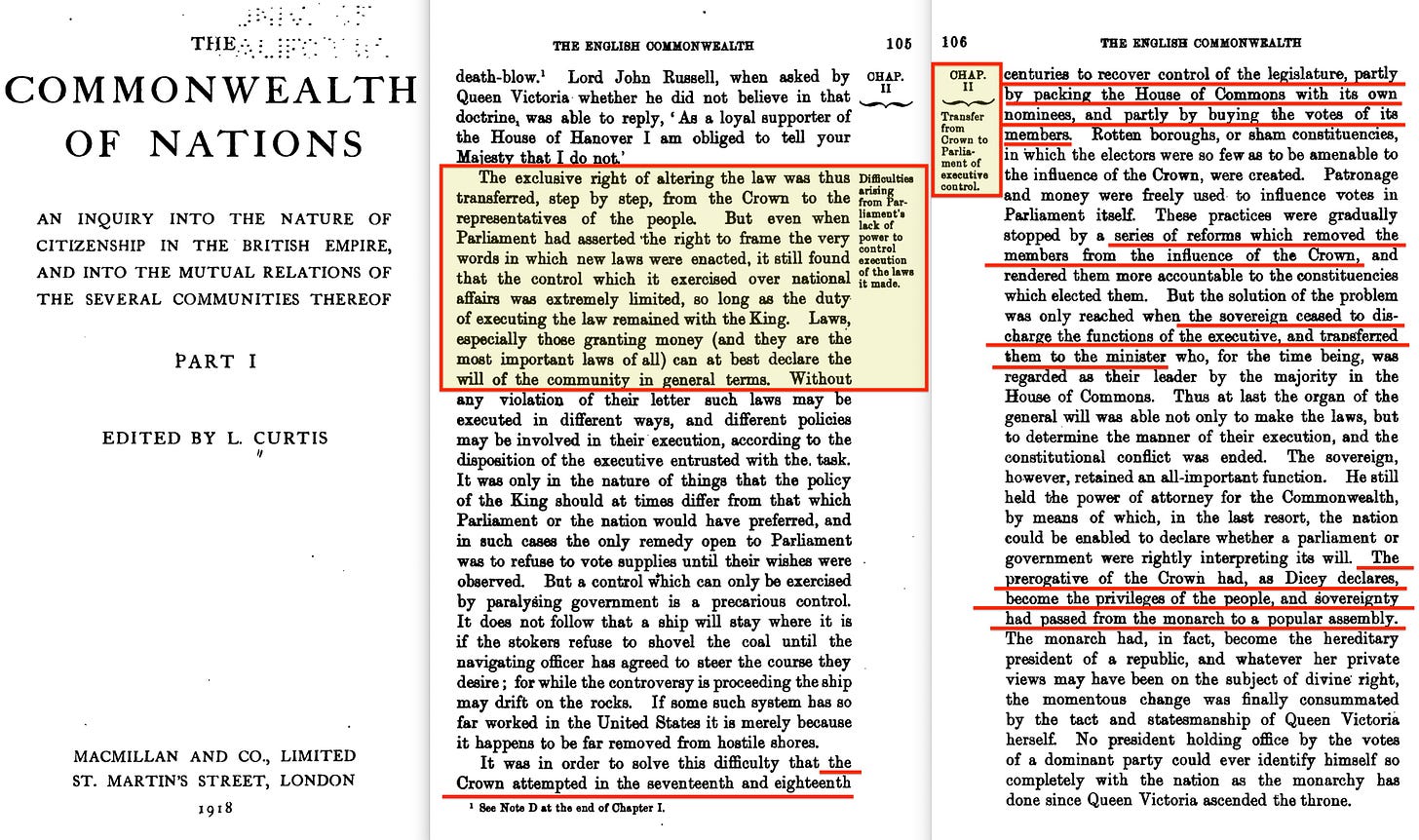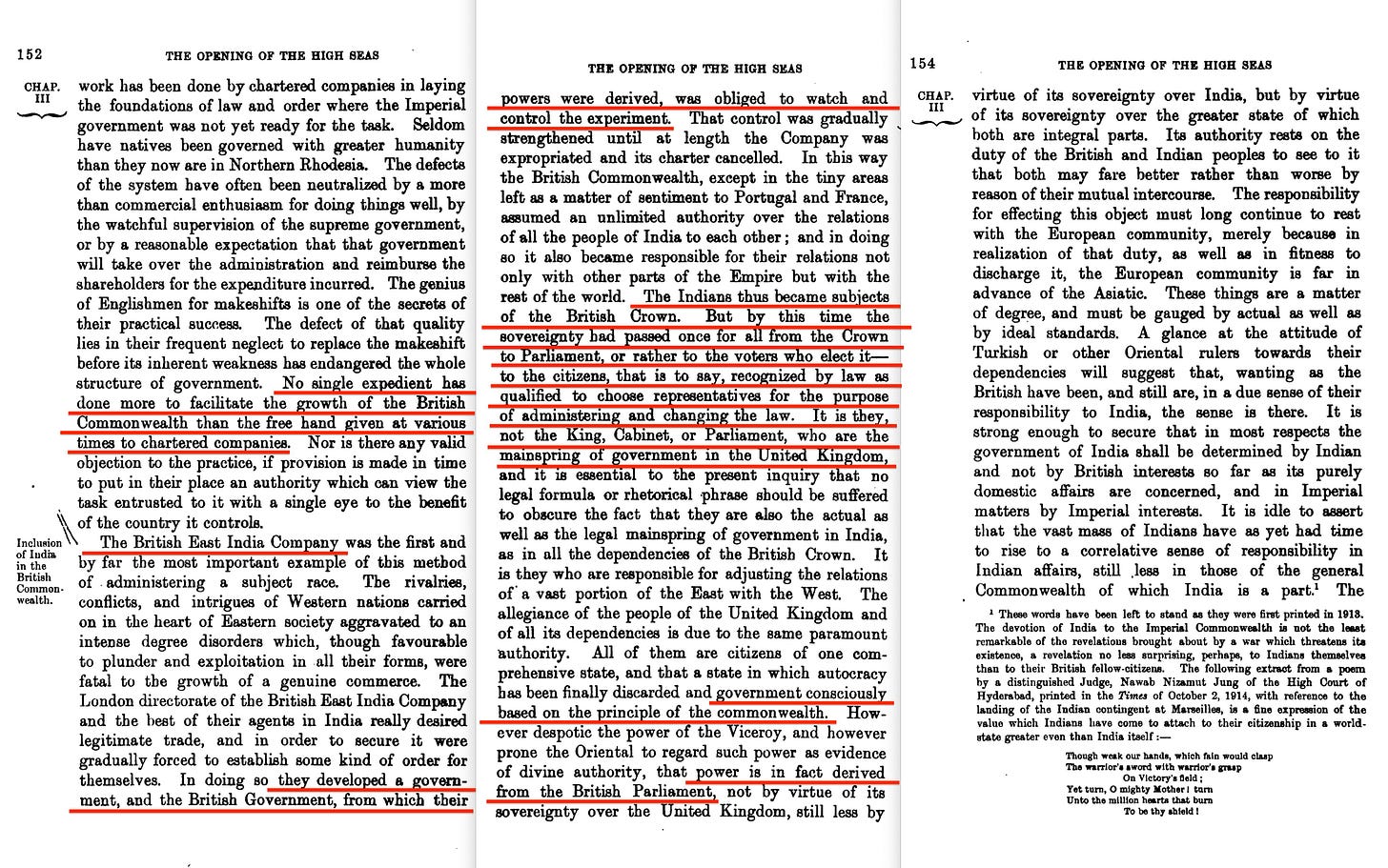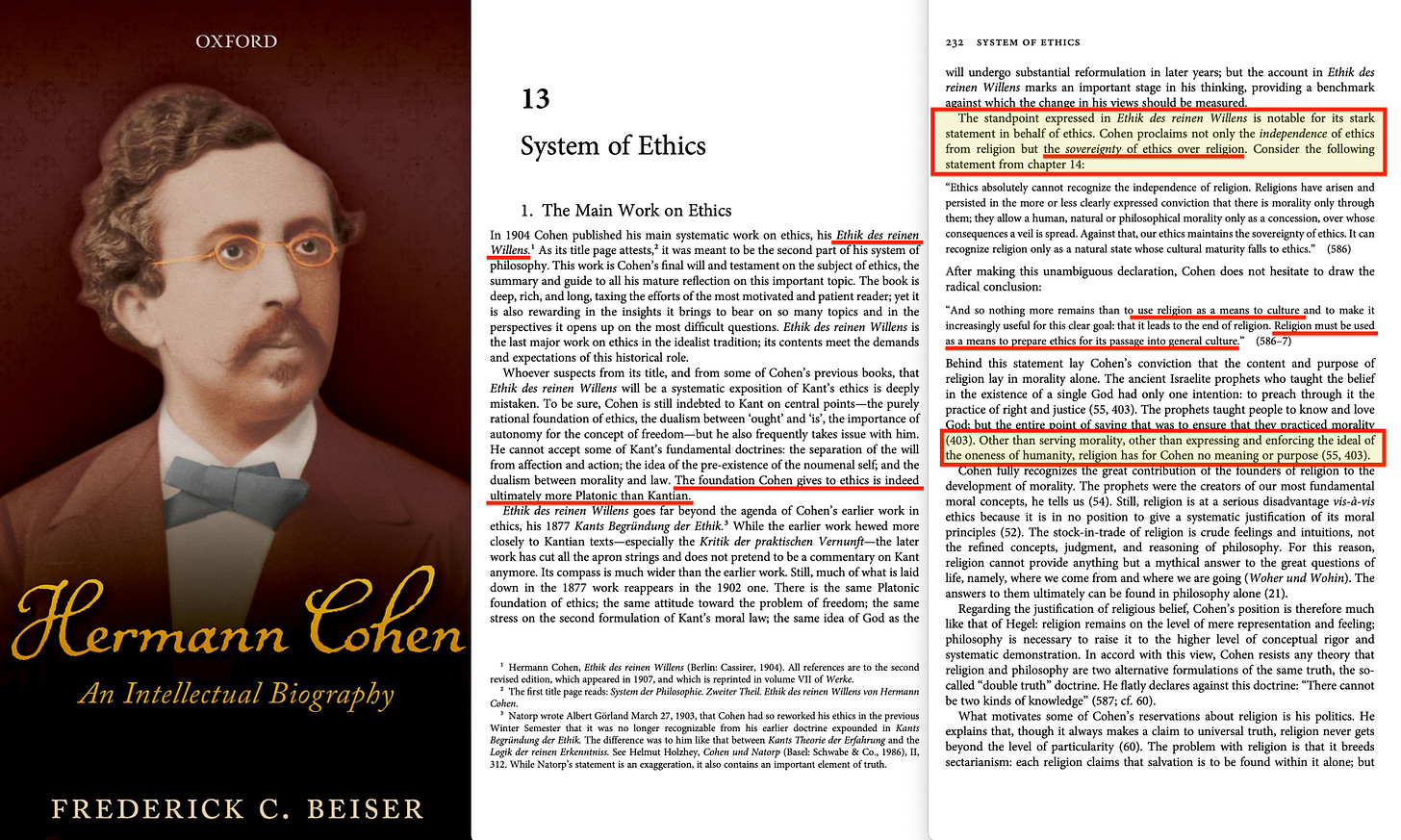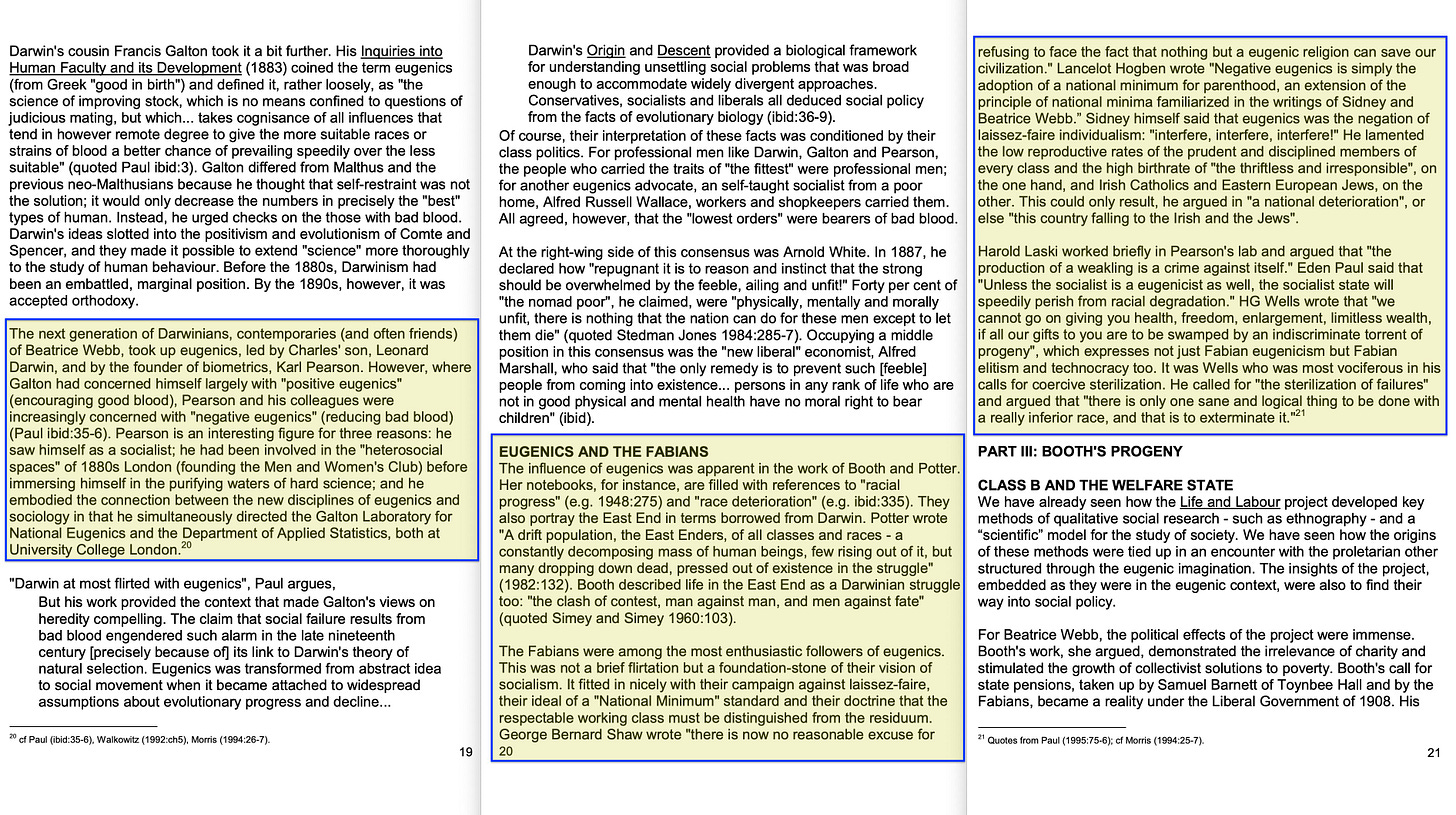Freedom and Planning
One of the documents I’ve struggled to locate is Freedom and Planning, related to the British organisation formed in 1931 called Political and Economic Planning — PEP, in short.
Upon locating the document, it proved to be rather controversial, so I thought it better to locate a second source — not because the legitimacy of the document is genuinely in question, but because its contents are, frankly, explosive.
The first source I located was in the annex of New Zealander Arthus Nelson Field’s 1936 book titled All These Things1. However, the controversial nature of the matter demanded confirmation that the material itself is legitimate. This confirmation was found via the June 8, 1934 congressional record2, which not only includes the same document in full but also additional material relating specifically to the association with the Fabian Society.
Truth be told—other material exists relating to this matter, but these sources often bear particular off-putting insignia, making it difficult to claim them as impartial.
Before we begin, let me reference a Wiki article on the matter3—not because I consider Wiki a particularly good source, and hence I only use it when material is not controversial or called into question (except when I use it to call out its editors, as I did in the post on Climategate). This, however, presents a different kind of opportunity: not only are the PEP documents hard to come by, but those that exist are stored only in paper format4.
In fact, the one reference URL on the Wiki page no longer works5. Amazingly, Wayback’s only cached version6 states that the URL is invalid7. Yet the Wiki page was first created in 20058, and the reference was added in 20079. So, apparently, in 18 years, Wayback never crawled this link10?
The odds… appear a tad long.
Meanwhile, the link to Huxley’s book titled Memories is noteworthy, especially as it not only confirms everything stated in the Wiki post11, but also clarifies Max Nicholson’s involvement with the Nature Conservancy at a time when they shared offices with PEP. That, in itself, is somewhat remarkable, as Nicholson later went on to co-found the WWF12 — while Huxley, of course, co-founded the IUCN.
For this review, I used the version printed in the congressional record, and it’s immediately clear that it dovetails with the ongoing depression, claiming that the existing way of doing things no longer will do—crises are always highly convenient when it comes to pushing policy.
Either way, this particular crisis is so severe that only a rational, intelligent response will suffice, though what’s promised through this material is not a return to prosperity, but rather an escape from the immediate crisis. And for this to have a chance of working, it requires:
… the intellectual and moral capital of man and women trained for civilization and citizenship.
Right off the bat, we have a moral call—one that hinges on the right kind of training, of a cosmopolitan sort, of course. In that regard, capital is international, and should the flow of credit especially come to a halt, our world quite simply will cease to be. But it’s not merely a question of credit; it’s also about the correct application of science, and:
Only our intelligence and powers of organisation and our moral and spiritual capacity to work in mutual cooperation with each other…
… it’s not merely a moral call but a spiritual one which requires the appropriate organisation. This is really important, because this crisis is global, with cracks allegedly appearing everywhere.
It is open to question whether the populations of Germany and central Eurioe can be fed and kept alive next winter… In the United States of America loss of confidence is absolute… the outcome is unpredictable but the consequences throughout the globe may be catastrophic… submergence of our civilization…
Sieff, who supposedly penned this pamphlet, is clearly pulling out all the stops here, and the core issue is quickly pinpointed:
… man’s powers of large-scale organisation have been overstrained… he has still to learn so to control and adapt his own human nature… to fit them and himself into their proper places in the organisation… mankind is not clever enough to control the machine which he has created.
See, the world has simply grown so complex that the only solution is to… centralise control with the few. It makes absolutely no sense from a logical perspective, but he, of course, hasn’t yet presented his alleged ‘solution’.
Britain is also in a heap of trouble, and the problem can only be solved through:
If Britain is to save herself and give the world that leadership which is urgently demanded, the first need is for complete reconstruction of our national life…
Yes, what Sieff is essentially calling for is a revolutionary approach with:
… the widest possible international cooperation.
And that’s amazingly convenient, because it just so happens that the United Kingdom as a colonial power is coming to an end. Well, not exactly, because in 1926 Alfred Zimmern—co-founder of the League of Nations—through his book The Third British Empire13 posits that the UK should divest of her powers and instead hand these over to the Royal Institute of International Affairs and other leading think tanks—such as the Council on Foreign Relations—while the empire itself is transitioned into a Commonwealth of Nations, much in alignment with Curtis’s call from 191814, which further clarifies that the Royal Family at this stage already is somewhat of a pet mascot, divested of its former powers.
And the focal point in this regard? Complementary trade. In fact, the empire:
In the imperial sphere there is practical unanimity as to the need for organising the Empire as an economic family…
Sieff continues by stating that our political and economic machinery is breaking down, and for that reason, we need to plan ahead. But public opinion poses a problem, because commonly the solution is a compromise that merely aggravates the evil and allegedly plays into the hands of authoritarian regimes.
Yet, these regimes do have one good thing in common—they enable the possibility of conscious forward planning, yet repudiate claims of personal liberty and freedom. The issue here is that failure to act, it is claimed, will lead to drifting, which in turn will lead to a loss of freedom and material well-being.
Consequently, forward planning becomes a requirement—but ideally one which reconciles ‘essential’ freedom. And since the calls for forward planning relate only to spheres of economic activity, perhaps, just perhaps, an ‘unprejudiced reexamination of what we call freedom’ will reveal an ‘active social conscience’ capable of solving both issues: forward planning while retaining ‘essential’ freedom.
Sieff insists we can apply a similar logic to that of motorists, where the law exists only to ensure those who break the code face the ‘collective will’.
And in case you didn’t pick up on that, this is essentially a pragmatic enforcement of normative codes such as ethics, which Hermann Cohen15 wrote about at length in terms of Infinite Judgment16. It leads to the same type of codified ethics that saw authoritarian regimes of the past turn tyrannical.
The issue here is the merger of a code of standards with legislation. To Hermann Cohen, ethics should be encoded in not only religion, but further law with an infinitesimal time delta. But since ethics and codes of behaviour are typically far less specific, this has continuously led to circumstances where people are imprisoned for failing to live up to their ‘moral duties.’ A ‘light’ version of this principle could be observed during the alleged pandemic, when healthcare staff were fired for ‘ethics violations’ after challenging obviously corrupt directives.
Thomas Paine incidentally separated ‘rights and responsibilities’ precisely by injecting the word ‘legal’ before responsibilities. This ensures you can only be guilty of breaking the law, which is typically far more precise in language.
Yet, Sieff claims that having a specific law to which we all must abide is a key reason why society is held back:
There is not a prior reason for regarding freedom of thought, freedom of speech, freedom of conscience, free institutions as incompatible with conscious forward planning of our economic life.
But this principle only holds if we are willing to exchange classical Western legal systems for ones grounded in ethical mandates—the very kind that enabled the ‘gigantic super-purges’ (per Hannah Arendt) of the Soviet Union following the 1936 constitution, which elevated moral duty to the state above individual rights.
Sieff then begins a search for a replacement of laissez-faire, and his opening argument is already fatally flawed when he claims:
In many cases the economic life of the world has become too complex, the scale too large, the marvelous stream of new scientific invention too bewildering, ... to allow of any return to nineteenth century methods.
The ‘nineteenth century method’ he refers to is the free market: people exchanging goods and services as they see fit, voluntarily. These free exchanges come with risk—many winners and losers continuously emerge through these transactions. Yet, it commonly turns out that who wins over the long run could not have been predicted at the time, because these were results of markets moving in unpredictable fashions. Alan Michael Sugar17, for instance, made a historically poor assessment of Apple’s iPod at the time, for which he later stood corrected.
Yet what Sieff is proposing here is that by eliminating these free exchanges, a few in charge can predict long-term outcomes better than the market itself—which consists of billions, even trillions, of independent, parallel transactions. Fundamentally, this is the key reason why collectivism always crashes. There is absolutely no way to forward-predict chaos theory with any legitimate precision over the long run. Yet, this fantasy is precisely what they have attempted to ‘sell’ repeatedly—only these days it relates to something vastly more complex than even the global economy: the climate.
Sieff spends some space justifying why this responsibility should be granted to scientific socialists of the technocratic sort, yet he finishes the section predictably—postponing any actual evidence to ‘separate essays’ which, much like Marx’s writings, will of course never be adequately covered—because the trick ultimately comes down to you not realizing this is all about control, and little else.
Sieff continues by outlining that in the capitalist system, it’s the consumer who ultimately dictates prices through individual choice, whereas the communist system relies on a central state doing much of this planning on behalf of the people—a system which ultimately leads to the treatment of individuals as mere cells in the human super-organism, to cite Alexander Bogdanov.
No, what is needed is a… Third Way, where:
Reasonable standardisation of some articles of ordinary consumption and some limits to excessive stimulation of the demand for the satisfaction of more whims which arises from unbridled competition among those who cater to them may indeed be welcomed.
… frankly, more exceptions exist to the rule than you can shake a stick at. The sentence is so chock full of criteria that require judgment that it’s entirely in the hands of some partial judge to decide—which, of course, is the express point.
But Sieff continues:
If there is to be a planning authority, its function must be to attempt to forecast demand and to regulate production and distribution accordingly, not to control or dictate consumption.
It’s remarkably manipulative, because consumption is production. Without production, there is no consumption, and Sieff’s insistence on managing this balance through distribution means one logically leads to the other—lest the inefficiency he claims the capitalist system is guilty of show up in his own.
But Sieff is not done with his remarkable deception:
Control of consumption on special cases… may be necessary for reasons arising out of human weakness, but the limits of such control are narrow, and its existence does not invalidate the general argument.
And those ‘special cases’ will, of course, rapidly expand the very second anyone’s rather daft enough to agree with his ‘Planning Authority’ he suggests next:
… organised control over overproduction and distribution… Control implies a controlling authority…
He spoke earlier in the document of the inefficiencies of overproduction. To eliminate these, we now need a planning authority that supposedly can forecast user preference with accuracy.
Again—you can’t. If anyone could, they could become overnight billionaires playing the stock market—or at least could have, before the central banks decided to engage in gross manipulation of the markets through their impossible attempts to ‘stabilise.’
Is there not a middle way, or better still a new way, of meeting the need for organisation and coordination of those economic tasks which the break-down of laissez-faire is leaving unaccomplished.
The commonly accepted term is ‘a third way’, Sieff.
He next lists the various public-utility bodies within spheres such as electricity, news broadcasting, and passenger transport, suggesting these should be extended to other areas such as industry and agriculture, with the idea being:
… with the Cabinet, Parliament, and the local authorities liberated from duties to which they are not ideally suited…
… so that we can install a group of technocrats to ‘mediate’ between inputs and outputs, you mean?
This is all compared to the grid, with power plants supplying the power, the grid distributing it, and the people and businesses consuming the electricity produced. See, first off, in this equation, the grid actually becomes the controlling entity—but we will return to this momentarily. However, there’s an additional issue here: electricity is fungible, meaning who supplies it doesn’t matter in the slightest. This is a very different proposition from farmers producing milk, because while one might favor volume, another might have carved out a niche catering to quality-minded customers, and yet a third might focus on organic produce. In other words, the various types of milk are not fungible—yet milk is precisely an example of an industry Sieff proposes extending this system to. The reason is quite simple: the organisation in charge of distribution will suddenly become incredibly powerful. It is they who will dictate the terms of delivery of milk produce to the farmers, with farmers unable to compete because the price is already set. Sure, you can argue that elements of this dynamic already exist—but that is beside the point, because it isn’t mandated.
The distributor in this arrangement will, in effect, become a mediator in the battle between oppressor vs. oppressed—sorry, I meant producer versus consumer. This mediating distributor will end up dictating common policy and will ultimately lead to a common set of standards from which every farmer will logically adopt one primary objective: meet the standard in the cheapest way possible by cutting quality. Yet this problem, of course, will be ‘solved’ by the likes of Sieff by introducing another set of mediators into the equation—who also will rule completely undemocratically.
Now scale this system to transport through rail, road, water, and air, and you’ll quickly find every carrier faced with a mountain of red tape, dictated through a process they cannot influence democratically because the ‘mediators’ were never voted into power in the first place.
The system presented here is precisely the one I have documented repeatedly on this Substack, with a meta-synthesis linked below. And this all leads back to Eduard Bernstein and—ultimately—Julius Wolf.
But the section that follows clarifies even further where Sieff is going with this.
… organisation on public-utility lines seems to be adapted rather to the rendering of services in the sphere of distribution than to the business of production.
This is an important inclusion, and I will tell you why.
Marx never treated distribution as separate from production; he understood it as a consequence of the underlying relations of production—a control mechanism mediating the flow of outputs back into the system as consumption or reinvestment.
What does that mean? In his view, distribution isn’t an autonomous category standing between supply (outputs) and demand (inputs). Rather, it’s defined by who owns, controls, and organizes the process that transforms inputs (labour and means of production) into outputs (goods and services).
And what does that imply? For Marx, distribution is not the product of a neutral supply-and-demand dial. It’s directly shaped by the mode of production itself—by the social and technical relations through which outputs are produced and by which they’re allocated back to different classes.
However, if distribution is redefined as a discrete stage in the supply chain—positioned strictly between production (supply of outputs) and consumption (demand for inputs)—it can be framed as a throttle for balancing outputs and inputs. Marx rejected this abstraction; in his theory, distribution is inseparable from production relations.
In other words, once distribution is decoupled from production, it becomes a regulatory valve—a role Alexander Bogdanov embraced in his techno-organizational model of the economy.
Sieff then continues through yet more inversionism:
Methods of retailing cannot indeed be left entirely unchanged…. The waste involved in the 500,000 or more retailed shops… cannot be allowed to continue to block the flow of goods from producer to consumer. And reorganisation of retail methods is necessary to achieve adequate organisation of products.
This is the express opposite of blocking the flow of goods. This is clear evidence of a robust, healthy, and thriving retail market, which enables a large assortment of different goods to flow to the consumer through a variety of retail outlets.
What Sieff is proposing is eliminating this highly efficient system, which caters to every demand, only to replace it with a somewhat more… Soviet solution.
In general, however, it will probably be found that there is a large place in the business of retailing for the continued play of individualism and personal enterprise… some corresponsing individuality of outlook in the retailer who caters to him.
This is, in effect, an admission that what Sieff suggests is to standardise and thus eliminate consumer choice. It’s the express opposite of freedom.
Not so in the sphere of production. The business of production must be planned… organise themselves on a cooperative basis will arise amongst the producers… the individualist manufacturer and farmer will be forced by events to submit to far-reaching changes in outlook and methods…
Indeed. These are not minor changes—they are revolutionary. We’re right back with Eduard Bernstein, and more notably—Lenin’s New Economic Policy.
But possibly the single worst line is incoming:
The danger is that in resisting them because he regards them as encroachments on what he calls his freedom, he will make things worse for himself and for the community.
That’s not what he ‘calls’ his freedom. That IS his freedom.
Then Sieff continues with yet another inversion, claiming that should he refuse, authoritarianism will inevitably follow.
No, Sieff—you’ve got that the wrong way around.
… he may be tempted to flirt with Fascist ideas. In either case he loses his cherished freedom, and it is only too probably…
Isn’t it just amazing how incredibly deceitful he truly is? At every juncture, he spins on a plate and readily chooses a different definition of key term, or a different perspective on the matter—one, typically, better suited to the core argument he seeks to make. Yet, finally, he shows at least some honesty:
It is idle to deny that some, at least, of the changes requires when conscious forward planning extends into the field of production are of a revolutionary character.
You don’t say.
It is all important, therefore, that we should appraise them soberly and without prejudice and distinguish clearly between unavoidable alterations of methods of economic organisation and fundamental attacks on our personal and political freedom.
What Sieff is telling you here is that you shouldn’t compare his revolutionary philosophy to the existing one at present. No, rather, you should compare it to his prediction of the worse alternative—i.e., outright communism.
Consequently, you should appreciate not what you lose, but what you will retain. That’s the spirit of his unbelievably dishonest argument.
Our economic freedom must be and always has been tempered by the conditions of out environment… spiritual freedom in a highly organised and complex society of civilised men and women is attainable only by ready cooperation in so arranging our economic life as to provide the best attainable material surroundings.
Now Sieff is essentially shifting the perspective away from individual health and liberty to that of the collective, framing it around spiritual cooperation for the provision of the aggregate good.
This is, in essence, a masterclass in manipulation. It carries on in familiar terms, as the farmer is revealed to retain full control of the operational aspects of his farm and fields—while administrative aspects such as quantities and quality of production are set by those in distribution. And that, as could be fully expected, can naturally ‘only be sketched in broad outlines’, because should they show their full hand, you’d object immediately. But, naturally, this is also framed to be to his advantage—at least partially:
He will be less exposed than at present to interference from above; that is, from Government departments and local bodies and their inspectors. He will be less free to make arbitrary decisions as to his own business outside the region of day-to-day operation of plant or farm.
But where it all begins to fall apart again is through Sieff’s next argument:
It must be presumed that the constituted authority will be armed by enabling act of Parliament and by a majority decision of its own members, presumably elected by the votes of those with whose aft'airs they deal, to exercise powers of compulsion over minorities in clearly specified cases.
This is, in essence, a dictatorship of the majority. Or at least it would be, were the candidates democratically elected in the first place. And as for to whom this applies:
… must be conceived of as applying generally to most if not all of the major fields of production and as part of a consciously and systematically planned agricultural and industrial organization
… that would be everyone, and certainly those in agriculture. Sieff then continues through the various boards they plan to introduce, including coal, industry, agriculture, cotton, steel, and milk—where he suddenly decides that the distributor can own the productive assets. In other words, literally every aspect of the plan is up for grabs because the plan is revolutionary. And as for democratic principles:
In the constitution of these bodies provision would naturally be made for suitable representation of interest, including organized labor…
Well, who gets to define what the term ‘suitable’ comprises? The stakeholders, rather obviously though the term was yet to be invented—because this is clearly yet another ‘inclusive’ and ‘participatory’ stakeholder ‘cosmopolitan democracy,’ featuring ‘subsidiarity’ which promises to ‘decentralise to the lowest appropriate extent’, leaving those higher up to determine what extent is appropriate.
But we’re not yet done. We are certainly not yet done, because in the following section, Sieff calls for ‘drastic changes in the ownership of land’—i.e., outright land confiscation, though this naturally revolves around claims of ‘equitable treatment of individuals.’ And to round off for good measure:
Here again limits of space preclude fuller treatment of the subject. All that is here relevant is the inevitable conclusion that the planned economy which the Nation needs to meet the demands of the twentieth century must clearly involve drastic inroads upon the rights of individual ownership of land as at present understood.
No wonder this material wasn’t broadly distributed. And an even bigger reason is up next, as the topic of finance comes up. Sieff begins by outlining that no major tax increases are expected—which of course is a lie. Especially given that:
In no sphere is the evidence of our loss of control of the machine of civilization more evident than in that of finance…
This naturally comes down to ‘price stability’—of the sort you cannot guarantee because forward prediction of chaos theory is impossible—yet he still issues a call for ‘stable money’, which aims to guarantee price stability in exactly the way that has never worked before. But it is in fact even worse:
One basic need of the new economic organization is the stabilization of the purchasing power of money. Stable money and conscious forward planning are mutually dependent. The elimination of violent fluctuations of the general price level will immensely facilitate improved organization of production and distribution…
See, what Sieff is saying here is that we cannot forward plan the economy without stable money. But you cannot guarantee stable money, because you cannot predict the output of the harvest two seasons from now. Consequently, there will be natural swings, and thus the ability to forward plan is exposed as an absurdity of its own. Sieff, of course, knows this, yet he makes another attempt to sell his snake oil:
This question is dealt with at length in a separate essay and the conclusion must perforce be taken for granted here.
It’s incredible, isn’t it? This is precisely what Marx excels at—creating promises, then attempting to cloud the fact that he cannot possibly deliver on them. How will the ‘dictatorship of the proletariat’ actually wither away? The answer beyond ultimately meaningless philosophical replies is, of course, is that it won’t—a fact of which Lenin was keenly aware, and consequently resorted to the inclusion of a ‘vanguard.’
Stable money cannot be secured without considerable extension of control on behalf of the community over the ft.ow of investment and the uses which the individual makes of his capital. While as consumer he can retain full freedom of choice as to which of his competing wants he will satisfy, there are real difficulties in leaving him entirely free to invest his savings in any way he chooses.
It is probable that many of these difficulties can be solved…
You, the prole, will not be allowed to invest your money as you see fit. In fact, over the long run, you probably won’t be allowed to invest at all.
From a logical perspective, the entire thing is utterly absurd. It’s Gordon Brown telling us he has ‘saved the world’18 only years after telling us ‘there will be no return to boom and bust’19. It’s just one breathtaking lie after another. And much like present European Union leadership:
… by means which, while leaving the small capitalist untrammeled, will so canalize the fiow of both long-term and short-term investment of the large sums which are at the disposal of banks and financial institutions as well as funds in the hands of large insurance companies as to insure that adequate capital is available for the big industrial, agricultural, and distributive corporations already invisaged…
Sieff seeks to control large-scale investments as well. The small owners will be left alone… for now anyway… while all banks and financial institutions will have demands put on them regarding investment of capital for the sake of the common goods already planned. To all of you who believe this is fascism—wake up. This is 100% concentrated Bogdanov’s scientific socialism, with hints of classic Marxism. Large enterprises will be allowed to accumulate wealth… for now. But when it no longer serves the purpose, those large companies presently soaking up sweetheart deals courtesy of the taxpayer will be clamped down hard upon.
So who might be behind all of this, you may ask?
The Bank of England has in the course of its history lost practically all of its original profit-making characteristics and become in fact, if not in form, a leading example of a public- utility corporation devoted to rendering public service. It has also many of the features of a self-governing institution…
But whereas all other organisations need to change—and that in a revolutionary manner:
It would appear to be sufficiently fiexible to enable it to adapt itself to filling its place in the new order without requiring any radical changes in its constitution…
Oddly, the Bank of England already has the perfect institutional foundation. Of course, we still have the issue relating to the major banks:
The logical completion of the process of amalgamation which has reduced the number of the major joint-stock banks to five would clearly be to merge them all in one and to give them some monopolistic privileges in return for converting themselve into a. real public-utility corporation…
That’s right—they should all be folded them all into a singular monopoly, at which stage they, of course, can be easily folded into the Bank of England itself. But Sieff is well aware of the tremendous levels of risk this comprises, because too much attention on the matter could give it all away:
This is a delicate process and it may be unwise to force the pace, seeing that natural developments are tending to bring about much the same results without outside intervention.
Fortunately, forces are naturally converging in this regard. I assume this relates to Bogdanov’s idea that you should manipulate everything else, thus leading to the correct conclusion. Think of someone placing road signs all pointing towards the Bank of England in this context.
The next topic is organised labour. Fortunately, stable money and the elimination of laissez-faire will magically resolve most related issues, so many such concerns can be discarded, and the worker can become a ‘partner in production’—precisely as they were in previous communist regimes. Beyond labour, education, housing, leisure, and even health require transformation, with the latter shifting its emphasis from cure to prevention—precisely the objective of the 1978 Declaration of Alma-Ata and the ‘Health for All’ initiative.
But where it becomes somewhat darker again is through:
… man should make effective use of biological knowledge to improve the human race and make himself more fit for his twentieth century responsibilities…
Is it just me, or does this carry undertones of eugenics—especially in light of Julian Huxley and the Fabian Society20 in general at the time21?
In terms of imperial planning, the United Kingdom is too small given the scale of the world—an argument used in Denmark during the 1992 Maastricht Treaty vote, and again recycled during the 2016 Brexit vote—but in general, the advice given here aligns strongly with Leonard S. Woolf’s International Government, which called for free trade and open borders, as this would gradually break down the nation-state in favour of international organisations beyond democratic control.
But the economy really is the centre point:
Within the British Empire and even beyond it in countries whose economic ties with Britain are historically close and whose trade is complementary, we have reasonable prospects of securing fruitful results by political and economic cooperation.
And the objective of it all?
The goal of world-wide international cooperation must never be lost from sight, and advantage must be taken of every opportunity for bringing it nearer. The very fact that it extends planning across existing political boundaries is of special value…
That is where Leonard S. Woolf enters the frame. Incidentally, Woolf was also a member of the Fabian Society, and his 1916 report was Alfred Zimmern’s blueprint regarding the founding of the League of Nations in 1919. Zimmern and Lionel Curtis—who co-founded the Royal Institute of International Affairs together in 1920—both called for converting the British Empire into a Commonwealth of Nations, which would expand until it covered the entire world. Zimmern’s 1926 book, The Third British Empire, called for elite think tanks like the RIIA to control this ‘Empire 3.0’.
A casual hint that should we fail to do so, the Soviet Union really is the only alternative—and you don’t want that, now do you?
As for the political process:
Effective planning on the economic side and even the introduction of desirable reforms in detail has become impossible without a drastic overhauling both of Parliament and the central government and of the machinery of local government.
That’s right. The entire framework needs changing, from national to local politics—thus aligning it closer with the likes of the ‘subsidiarity’ we see at present.
Political and economic planning are complementary and supplementary to each other and must be carefully interrelated. We need new economic and political institutions to match the new social adjustments which applied science has created and a new technique both in politics and in industry to enable us to find intelligent methods of surmounting new difficulties and complexities.
We can’t have forward planning—initially promised to be about the economy—without a complete reform of the political system. This reform should focus on… let’s be honest—the application of scientific rationality, because what is deceptively described through this pamphlet is quite simply Scientific Socialism. And in this context, this naturally calls for:
It has been suggested more than once in the course of this essay that devolution of powers to statutory bodies will be an important feature of the new order, and that iu the result Parliament and the Cabinet will be relieved of some part of their present duties and set free to the great advantage of themselves and of the nation for their proper tasks of directing and guiding public policy.
The document is quite simply explosive. The powers granted to bodies outside democratic capacity are, of course, akin to technocratic ideals. The net result is that the duties for which politicians are elected will be limited to those they supposedly represent you in regards to.
We can largely skip the next section on planning and economic freedom, though with one exception:
Though organized on public-utility lines with monopolistic privileges, the great chartered industrial corporations will :find ample room for energy and initiative in performing their primary task of combining maximum output with minimum costs of production…
There you go. It’s an exercise in cutting costs because standards and objectives are set externally. And when the time comes, those industrial corporations will predictably be cut down to size and integrated with the communist state.
As for what kind of economy is in waiting:
It is no part of our plan to enshrine equalitarian doctrines or to eliminate from business life the desire to better oneself and the motive of personal reward. Subordination of the motive of profit to the motive of service does not imply that the motive of profit has no useful part to play…
But it is subordinated to that of service for, well, the common good. Don’t worry, because at least this realignment:
Experience alone can prove the justice of our claim that economic freedom will not be fatally shackled by the effects of conscious forward planning. Experience, too, will be needed to make clear the boundaries of the province within which individualistic effort can best be relied upon to secure the highest national dividend.
We have, in just a few pages, gone from this plan being our best hope, and a ‘mere tinkering,’ to being revolutionary, to finally promising that it won’t fatally shackle economic freedom. But Sieff even has the gall to claim this is:
A CONSERVATIVE EVOLUTION
This is not conservative. Nor is it evolutionary. This is a straight path to scientific socialism. And amazingly, the only organisation which won’t need to change is the Bank of England. Do I really need to tell you who’s behind all of this?
But, hey, at least they have the full vision, right?
The purpose of this essay is not to put before the reader any complete or fully worked-out pian of national reconstruction. That can be done only in a series of separate essays, and even then much of the necessary details would have to be left out…
And let’s just accelerate where we can now, because we are largely retreading ground, yet some is worth revisiting:
This generation is called upon to accept modifications in the structure of its economic life, which are profound enough to require an altogether new outlook on the content and meaning of economic freedom.
Communism, in other words.
Economic freedom must always be relative to its environment. Economic freedom demands that form of economic organization of civilized society which will provide men and women with the highest standards of material well-being attainable by the use of their powers of scientific production and cooperative endeavor, in order that the environment thus afforded may present the widest possible opportunities for the exercise of the human nature…
… though alternatively you could interpret it as Bogdanov’s Scientific Socialism.
But McFadden adds more material, with an article from the Daily Herald revealing that the PEP is nothing short of a branch of the Fabian Society, and that they have completely corrupted government and civil service at this juncture. He further cites material stating with no uncertainty that the end objective of the Fabian Society is no different from that of the Marxists, only to leave these pages with somewhat of a warning:
Frank Podmore, well-known spiritualist and occultist, one of the founders of the Fabian Society, is quoted as saying to the earliest members: .. For the right moment you must wait, as Fabius did most patiently, when warring against Hannibal, though many censured his delays; but when the time comes, you must strike hard, as Fabius did, or your waiting will be in vain and fruitless."
Let’s opt for the latter option, eh?
Finally:
During 1931 this group of Fabians-among them Gerald Barry, I. Nicholson, and Kenneth Lindsay-used a newspaper at that time owned by Lord Beaverbrook and called "The Week End Review" as a vehicle for their ideas. It is understood that Beaverbrook, upon becoming familiar with their plans, disapproved; whereupon they left his paper and continued to publish their ideas in another on means furnished, according to my informant, by Mrs. Leonard Elmhirst, formerly Dorothy Willard Straight, nee Whitney, Sir Basil P. Blackett, governor of the Bank of England, became chairman of the group in 1931. From this time the organization was called the " political economic plan." Among other members were Israel Moses Sieff, Sir Henry Bunbury, Graeme Haldane, I. Hodges, Lady Reading, Daniel Neal, and H. V. Hodson. Monthly meetings were held, at which Mrs. Elmhirst was present. Finally the group split on international policy, and Sir Basil P. Blackett resigned and Israel Moses Sieff became chairman in July 1932. It is said that since becoming head of the group Sieff has spent £60,000 on the movement.
I don’t believe Blackett was governor of the Bank of England, but he was a director of the BoE. However, another thing that appears suspicious:
In the fall of 1932 the following people joined the political economic plan: Sir Arthur Salter; Sir Oswald Moseley, the head of the new British Union of Fascists; Lord Eustace Percy; Lord Melchett, the son of the late Alfred Mond; and Sir Christopher Turnor.
There are a number of reasons why Mosley appears suspicious to me, and that’s a major one. I just don’t trust Mosley to have been unable to decipher their intent, especially given the Imperial Fascist League at the time certainly had a firm voice in that regard.
This legitimacy of the document is not disputed. Nor is it denied. The only real question relates to who wrote it.
Sieff, at this stage, was an early major funder of the group and took over control in 1932, meaning he was in charge when it was penned. Other material from the time mentions this as the work of Sieff, not least Field, whose version of the same document is attached below:
Another point of interest here is Max Nicholson. He went on to co-found the World Wide Fund for Nature in 1961, the more public-facing version of Julian Huxley’s IUCN. Both Huxley and Nicholson were early and prominent members of PEP, which seems a rather astonishing coincidence given that nature became the chosen path for future global governance.
And there’s another pattern emerging here. Sieff mentioned the farmers servicing the operational aspects of this scheme, with administration running through those responsible for distribution, such as the milk or electricity board. So, who exactly would be in charge of strategic planning and research?
Because we see this split elsewhere. The RIIA essentially strategised in the Third British Empire, while the Fabian Society worked as administrators, and the British Labour Party acted as political operators. And—by sheer coincidence—it was precisely the same three-way split Arthur Schlesinger, Jr. proposed in June 1961 regarding the restructuring of the CIA22. Of course, Schlesinger expected Robert Amory, Jr. to become head of the research and strategy operation—a plan that was shot down when JFK instead opted to fire him in the aftermath of the Bay of Pigs.
But then—perhaps it’s not so strange we see the same model repeatedly, given that it describes three of the five steps of Stafford Beer’s Viable Systems Model. And should you decide to reverse this model, you’ll magically arrive at Wolfgang Reinicke’s Trisectoral Networks.
And perhaps that’s not so strange either—because whether described through the lens of Beer or Reinicke, both are essentially implementations of Adaptive Management, though Beer’s is the passive kind while Reinicke’s is the active.
But one question goes begging.
This document was likely never intended for public eyes—certainly not beyond the leadership tier of PEP. Yet it is phrased in some of the most deliberately manipulative language imaginable. Why?
Was it simply to ensure internal coherence—to keep all operatives aligned with the same vocabulary, the same moral grammar? Or was PEP, in the end, just another instrument of control—crafted for the purposes of hyper-manipulative central bankers cloaked behind philanthropic planning? And if that’s the case—how many within PEP truly understood the game they were playing?
Were they architects… or were they, too, being played?






































